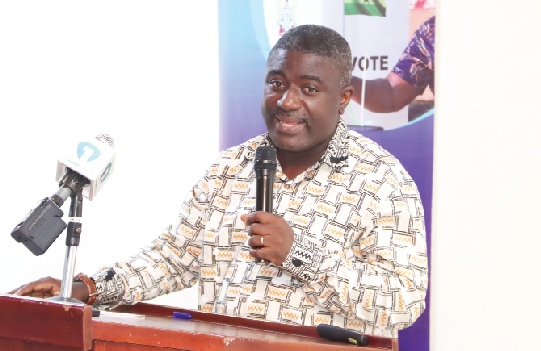
EC starts Election 2024 staff training
The Electoral Commission (EC) has commenced the training of over 200,000 staff for the conduct of the December 7 presidential and parliamentary elections, the Deputy Chairperson of the EC in charge of Corporate Services, Dr Eric Bossman Asare, has said.
He said the training, which began at the national level this week, would be followed by that of the regional and constituency levels.
Dr Asare added that for each polling station, five trained individuals would play the respective role of a presiding officer, name reference list officer, verification officer and ballot issuers for the presidential and parliamentary elections.
That, he said, was to ensure a smooth electoral process.
Dr Asare said this in Accra yesterday while speaking on the topic " The role of citizens in a free, fair and transparent elections,” at a national forum on the effect of money (monetisation of elections) on the outcome of Ghana's elections.
The EC Deputy Chairperson said the commission was poised to conduct a successful, credible, inclusive and participatory election.
“With over 18.7 million registered voters nationwide and a goal to maintain or surpass the 79 per cent voter turnout recorded in 2020, the commission is leaving no stone unturned,” he said.
Role of citizens
Dr Asare emphasised that as a citizen, it was one's primary responsibility to exercise his/her fundamental human right to vote.
"The right to vote is an inalienable right that cannot be taken away from you," he stated.
![]()
"Registered voters are expected to go to their polling stations and exercise their franchise to choose the next President and Member of Parliament," he added.
Dr Asare stressed the importance of citizen participation in demanding democracy, and cautioned against the influence of money in elections and the need to guard against misinformation and disinformation.
Collation
Touching on the collation of results, Dr Asare said results would be collated from polling stations to constituency collation centres, then to regional collation centres, and finally to the national collation centre.
"At the constituency level, returning officers will announce presidential election results, which will then be taken to the regional level," Dr Asare explained.
"However, only the Chairperson of the Electoral Commission has the legal authority to declare the final presidential election results at the national level," he stated.
The EC’s Deputy Chairperson, Electoral Services, said the commission had also introduced collation officers with statistical and mathematical background to support result collation at the constituency, regional and national levels.
“This measure is to alleviate the workload on returning officers and technicians,” Dr Asare stated.
With robust measures in place, he said, the commission was confident of delivering another peaceful and transparent elections.
Campaign period
The Executive Director of the Africa Centre for International Law and Accountability, William Nyarko, who spoke on the topic "Campaign financing and its effects on Ghana's elections and development," drummed home the need for Ghana to establish legislated campaign periods to prevent excessive spending during elections.
"If you have an unlimited campaign period, then you will be spending more money," Mr Nyarko stated.
He cited the United Kingdom where the election management body set a specific campaign period, commencing when candidates were deemed eligible to contest, to buttress his point.
That regulation, Mr Nyarko said, was crucial in preventing the abuse of state resources, a common issue in Ghana since 1992.
The Forum
The forum brought together a section of the public, including personnel of the various security agencies, senior high school students, the media, civil society organisations and political parties, among others.
It was to address the impact of monetisation on elections outcomes and advocate meaningful reforms in Ghana’s campaign financing.
The Ghana Anti-Corruption Coalition, the Ghana Integrity Initiative and the Ghana Centre for Democratic Development organised the forum with support from the United States Agency for International Development through the International Foundation for Electoral Systems.
